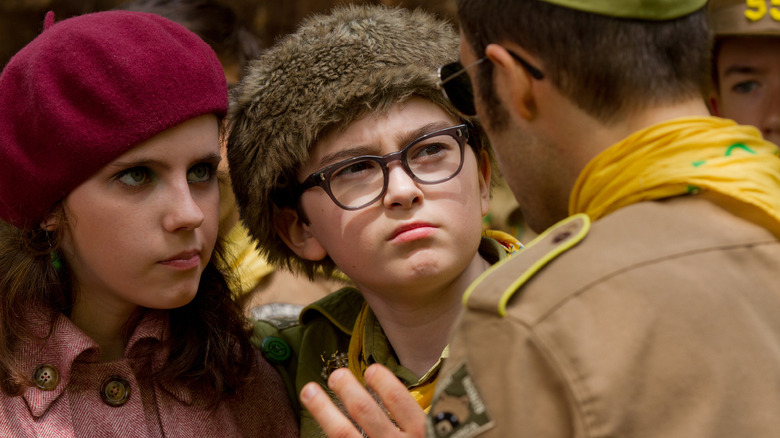A Heavy Detail In Moonrise Kingdom Came From Director Wes Anderson's Real Life
"Moonrise Kingdom" was the film that made me fall in love with Wes Anderson's work. It's not that I disliked his earlier stuff; ironically, one of his least well-received films, "The Life Aquatic with Steve Zissou," was also the one that started turning me onto his movies in the first place. Yet, it was 2012's "Moonrise Kingdom" that solidified me as a Fanderson or Westie or whatever you call those who can't get enough of the quirky cineaste's funny, melancholic, meticulously curated art.
The movie centers on a pair of eccentric 12-year-olds — orphan and devoted Khaki Scout Sam (Jared Gilman) and rebellious Suzy (Kara Hayward) — who develop a romantic attraction to one another and, feeling alienated from the rest of their community on the small fictional island of New Penzance, conspire to run away together. Meanwhile, the adults in their lives scramble to bring them home, yet are just as often tripped up by their personal grievances and relationship woes as the children's scheming.
In other words, "Moonrise Kingdom" is a film for adults but remembers what it's like to be a child, much like Hayao Miyazaki's "The Boy and the Heron" and myriads of other coming-of-age tales before them. The other thing they have in common? Specific details were lifted straight from the filmmakers' own lives.
Anderson confirmed as much in 2012 when Vanity Fair asked him if Suzy's parents having a "Coping with a Troubled Child" pamphlet in their home came from his own childhood:
"[Pause] Yes. It was directly taken from my childhood. It wasn't anything terrible. It's just something that at the time, when I found it, I was like [grits teeth], 'What is this!' I immediately knew who that troubled child was even though hypothetically it could have been someone else."
Wes Anderson drew from his own childhood for Moonrise Kingdom
Sam and Suzy feel like they could be equally inspired by what Anderson himself was like as a child. With Sam, you get the stickler side of the filmmaker with his fastidious attention to detail. (Edward Norton as Sam's mentor, Scout Master Ward, works just as perfectly as a stand-in for the grown-up Anderson.) Suzy's bookworm personality and world-savvy tastes in literature — despite her being as American as apple pie — are also reminiscent of the real-life, Texas-born Anderson, whose appreciation for varied types of international cinema are readily-apparent in his films.
Anderson has said in multiple interviews that Suzy, in particular, is one of his most personal characters, which makes the "Troubled Child" pamphlet all the more revealing. Perhaps for that reason, he was hesitant to discuss the matter with his parents at the time of the movie's release. When asked if he talked to them about it after they saw the film, Anderson replied:
"No. It was in my father's house. That's a conversation I don't think anyone would care to have. But my father has a Google alert so he sees practically everything written about me. He usually keeps me posted. He hasn't brought anything up, though, so maybe he'll just let this be."
This practice of basing his characters on real-life people is essential to what makes Anderson's films so personable beneath their whimsical surface. The closer you look at his films, the more you realize he pours a whole lot of his heart and soul into them, which is one of the many things those boring AI Wes Anderson knockoffs misunderstand completely. As with the "Troubled" children in "Moonrise Kingdom," they're not so hard to understand and appreciate if you take the time to get to know them.

